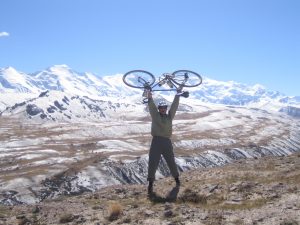From tea with border officials, to elephant attacks, and blown up bridges, Henry Gold’s 15 year career as the founder and Managing Director of TDA Global Cycling has seen him overcome great obstacles. Through each of these harrowing tales, he shares some insights into what he did to get through these difficulties. The tips have a universal element to them that can be applied not only to cycle adventures in rural India, but to the important decisions that business leaders make on a daily basis.
- Investing time in a cup of tea, can save you money and time
 TDA Global Cycling specializes in long distance tours that cross many international borders. Borders can be time consuming and frustrating places, more so with 40 or more cyclists. The natural instinct of a traveler is to get it over with fast and keep moving forward.
TDA Global Cycling specializes in long distance tours that cross many international borders. Borders can be time consuming and frustrating places, more so with 40 or more cyclists. The natural instinct of a traveler is to get it over with fast and keep moving forward.Years ago I brought a group through Ethiopia/Kenya border and my wallet had gone missing. I spent time in the company of the head honcho – a customs and immigration officer at the the border post. We shared a few cups of tea and chatted longer than was necessary.
A few years later at this same border crossing, due to some confusion on his part when he entered the country, one of our cyclists did not have an entry stamp. The officials insisted he had to go back to the capital city and get the stamp, a huge and costly problem for both of us. I sat around for a while and at one point asked very politely if we can consult his superior. He agreed and took me to his boss. The boss – none other than the head honcho I’d shared tea with - opened the door and said: “Henry, what are you doing here”.
Costly and time consuming problem solved!
- Telling a story can be better than strategic action
- Ask and then ask again and again - the new information could be critical
- To lead successfully you do not need to have immediate answers
 Being on a bicycle tour in a country that is recovering from civil war is not for everyone. Even for those who think of themselves as able to deal with stress. Panic can take over a group quickly with potential serious consequences that can be more dangerous than the event itself.
Being on a bicycle tour in a country that is recovering from civil war is not for everyone. Even for those who think of themselves as able to deal with stress. Panic can take over a group quickly with potential serious consequences that can be more dangerous than the event itself.A tour leader on our inaugural cycle tour thru Colombia in 2015 had discovered a bridge was blown up overnight on the route our cyclists were due to cross within just a few hours. At this stage 45 riders were spread over a distance of 20 km with me being the last, far behind. In communication with the tour leader we decided to reverse the riders and gather the group together. The cyclists returned one by one, some already near panic. Though not having any immediate answers or plans, we decided quickly to call a meeting, explain the situation, indicate options we are investigating and deal with the anxiety. We then continued with regular briefings as we gathered information, assessed options and reassured the group that we are not in any immediate danger.
By these actions we kept the group unified, preempted rumors and possible impulsive actions that could endanger individual cyclists and even the whole group.
- Expect the unexpected - it can save your business and your life
Both my companion and I were unhurt but I sure learned a hard lesson, and I was not in a hurry anymore. With no pothole we would have been fine, but I sure was not prepared for a pothole, a child, an animal on the road or a stalled truck - all a possibility everywhere, but especially in unknown places.
- Good intentions can also lead you to a disaster
A few minutes later they waved me back. The car was ready. I looked around, thought that maybe it would be a good idea to check the bolts, but with the heat, and not wishing to appear ungrateful I convinced myself that all was good. I took off. Ten minutes later, I experienced a weird sensation.. Out of the corner of my eye, I saw a car wheel roll in front of my vehicle and then the noise of the car hitting the road Sudanese hospitality is famous, but my reluctance to seem ungrateful could have ended much worse.
